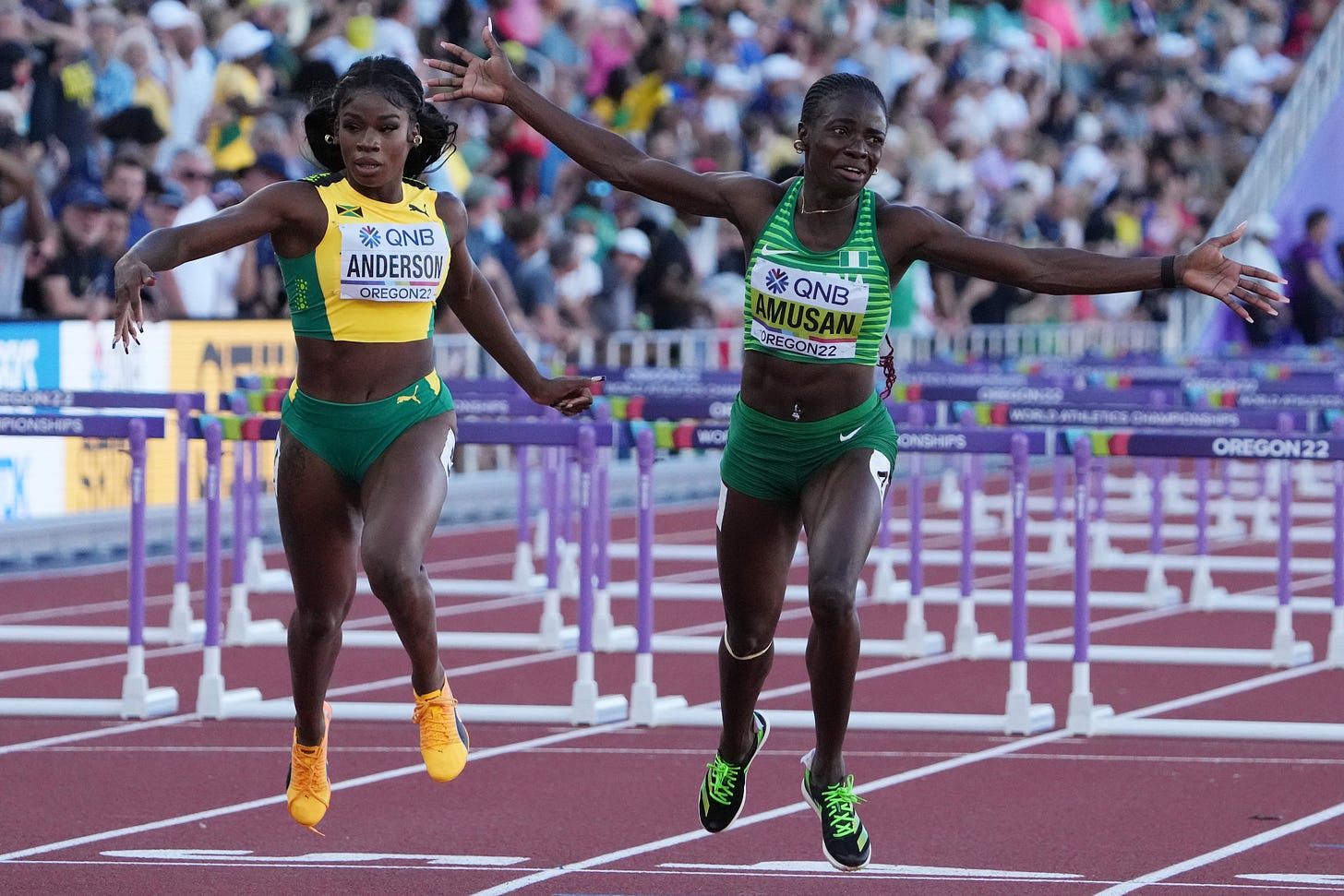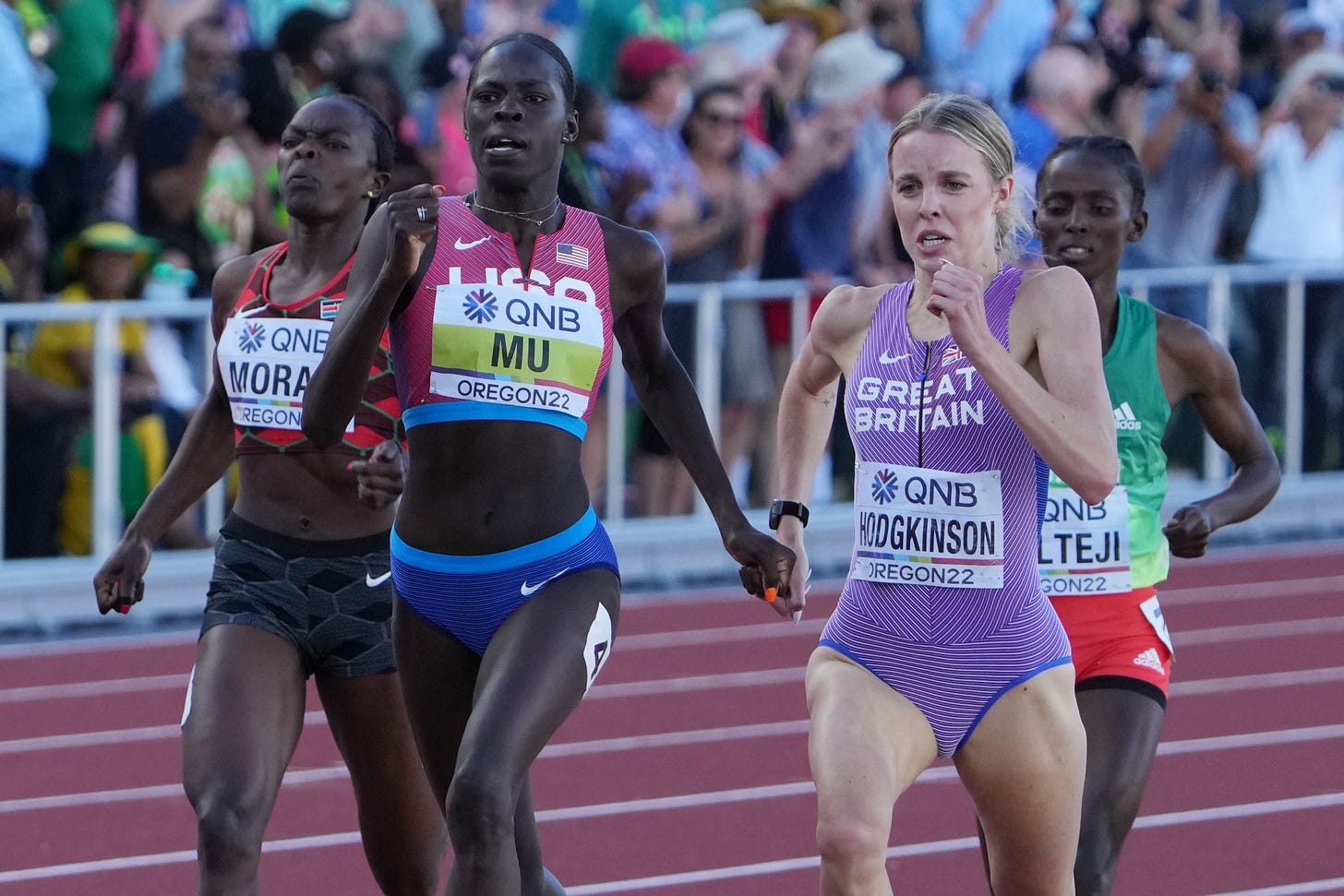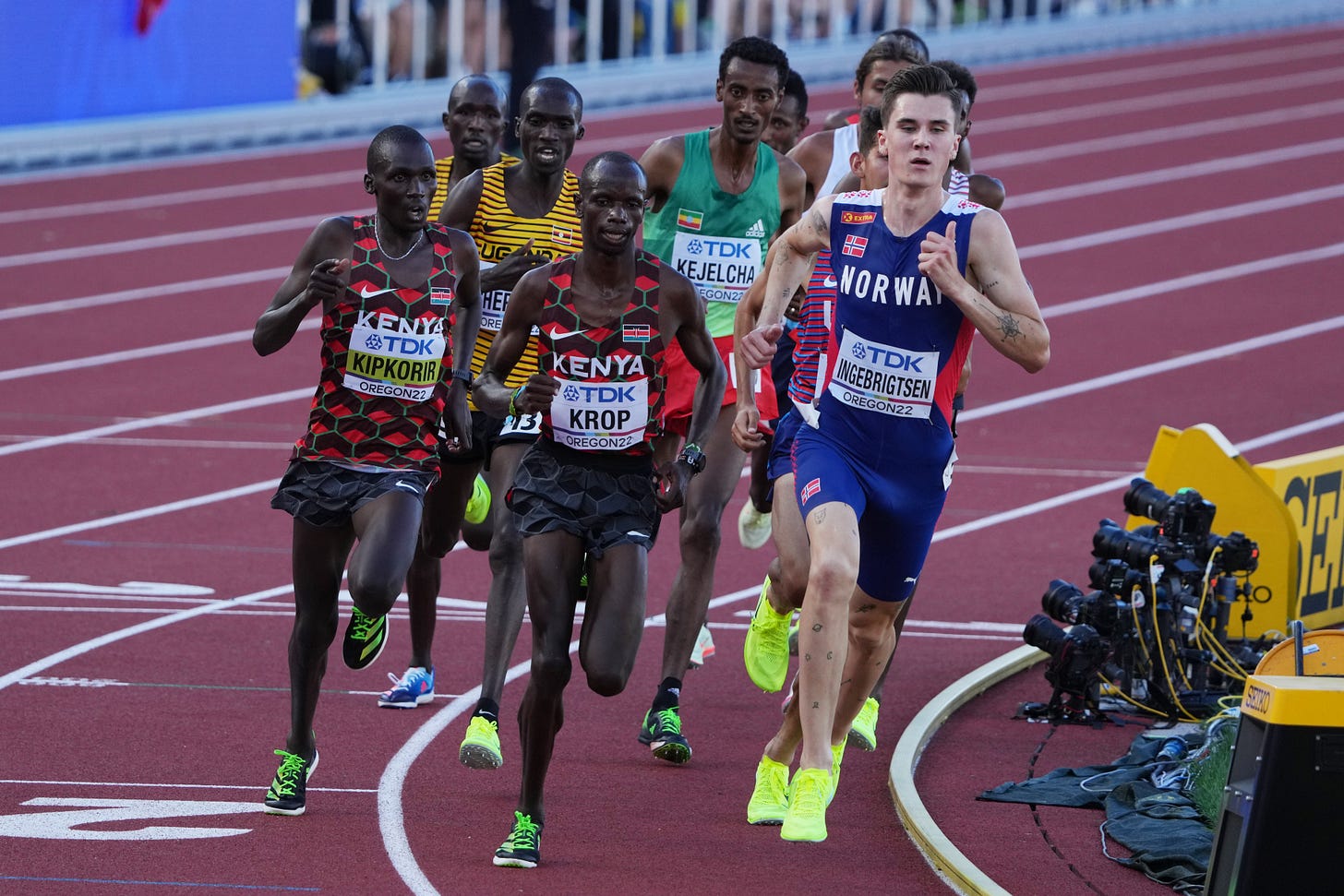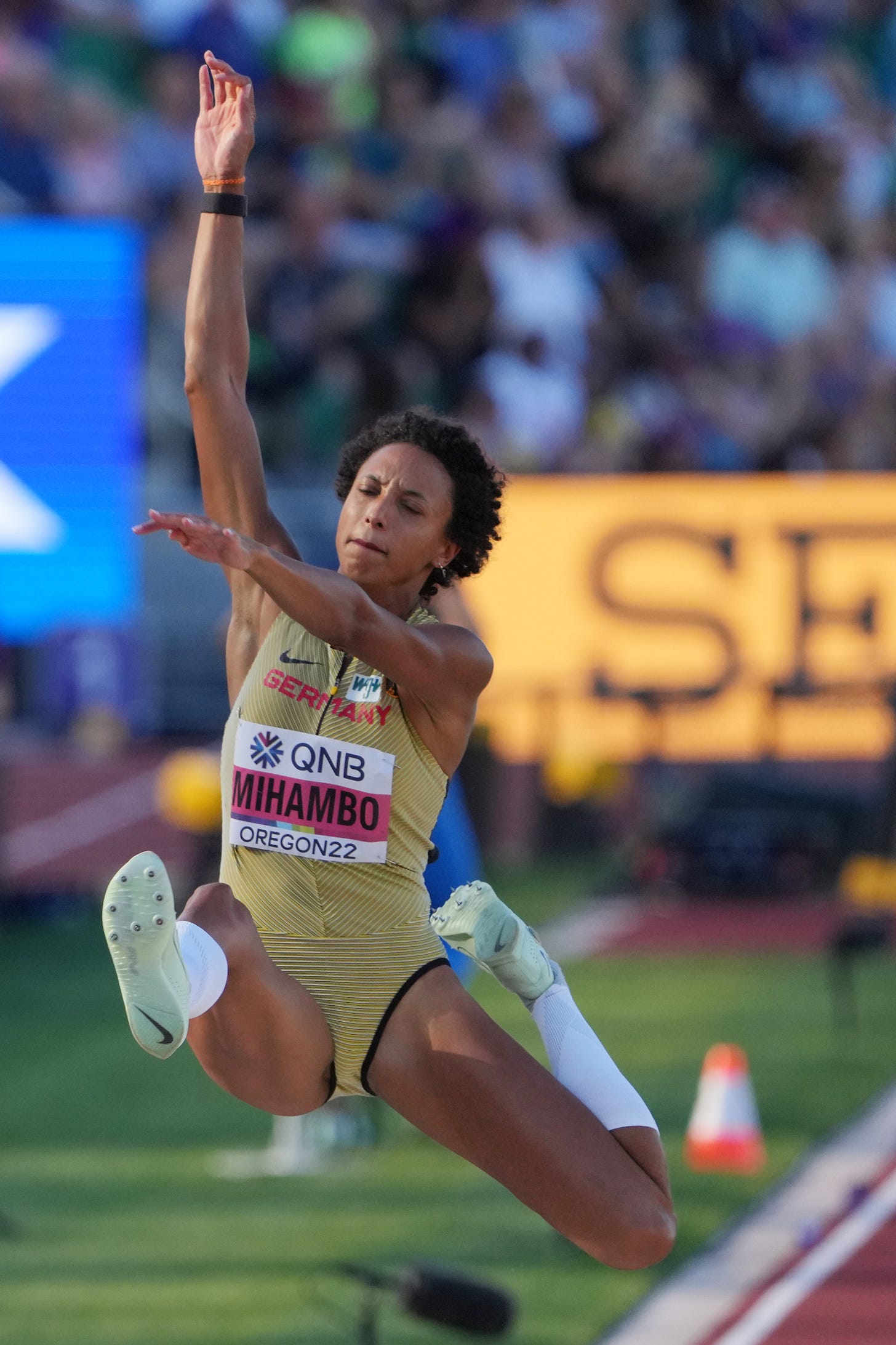World records, U.S. relay wins top final day of World Champs
American men and women post runaway victories in 1600-meter relays

EUGENE, Oregon – Prior to the start of the World Athletics Championships on July 15, pole vaulter Mondo Duplantis of Sweden was one of a handful of athletes deemed to have the best shot at setting a world record in the 10-day meet that concluded on Sunday.
The others were women’s 400-meter hurdler Sydney McLaughlin of the U.S., women’s triple jumper Yulimar Rojas of Venezuela, and men’s shot putter Ryan Crouser of the U.S.
Tobi Amusan of Nigeria was regarded as a potential medalist in the women’s 100-meter hurdles entering the championships at the University of Oregon’s Hayward Field. But it would have been preposterous to say she could seriously threaten the world record of 12.20 seconds in the 100 hurdles that American Keni Harrison had set in 2016.
Yet it was Amusan who ran a world record of 12.12 in her semifinal race of the World Championships on Sunday before winning the final in a wind-aided 12.06.
Olympic champion Duplantis put an exclamation point on an outstanding championship meet by clearing a world record of 6.21 meters (20 feet 4½ inches) in the men’s pole vault. But Amusan’s times in the 100 hurdles were the performances that shocked the vocal, enthusiastic crowd.
“I believe in my abilities, but I was not expecting a world record at these championships,” Amusan said in a post on the World Athletics website. “It’s a dream come true. I know I had it in me, but I could not believe it when I saw it on the screen after the semis. But it was just a matter of time.”
Amusan, the No. 3-ranked 100-meter hurdler in the world by Track & Field News last year, had run a personal best – and African record – of 12.40 in a first-round heat on Saturday. But that did not prepare anyone for her 12.12 semifinal run that left her .15 seconds ahead of second-place Harrison and was the largest lowering of the world record in the event since Grazyna Rabszyn of Poland ran 12.36 in 1980 to destroy her previous world best of 12.48.
Amusan’s time was so mind-boggling that I immediately wondered if it were wind-aided. When the wind readings indicated that was not the case, I wondered if the timing system was working properly. But roughly an hour and 45 minutes later, she ran a wind-aided 12.06 to win the final by a huge margin as Britany Anderson of Jamaica and Olympic champion Jasmine Camacho-Quinn of Puerto Rico finished second and third with identical times of 12.23.
As she had done in her semifinal, the former NCAA champion for the University of Texas El Paso got off to a great start before motoring away from the field. Harrison, who was running in lane three, next to Amusan in lane four, finished eighth – and last – in the race before being disqualified because she had run through the ninth hurdle before slowly clearing the 10th and final barrier.
All of that took place roughly an hour before Duplantis took his second attempt at the world-record height.
The 22-year-old Olympic champion had bailed out on his first attempt which he took prior to the start of the women’s 1,600-meter relay. But shortly after the U.S. won that event to conclude the track portion of the championships, Duplantis cleared the bar with room to spare.
The height added five centimeters to the outdoor world record of 6.16 (20-2½) that Duplantis had set in the Bauhaus-Galan meet in Stockholm on June 30, and it was a centimeter better than the 6.20 (20-4) height he had cleared in winning the World Indoor Championships in Belgrade, Serbia, in March.
“I did not think about the record that much today,” Duplantis said. “Usually, it is always somewhere in the back of my mind. But today I was really focused on the win, and I wanted to win the gold medal so badly. You get quite a bit of pressure on you when you’re the only person competing in the entire track. It’s an honor when people stay in their seats and it’s literally only me on the track.”
Duplantis and Amusan were two of seven individuals who won gold medals on Sunday.
The others were Norwegian Jakob Ingebrigtsen in the men’s 5,000 meters, Frenchman Kevin Mayer in the decathlon, Italian Massino Stano in the men’s 35-kilometer walk, American Athing Mu in the women’s 800, and German Malaika Mihambo in the women’s long jump.
In addition, the U.S. won the men’s and women’s 1,600-meter relays to bring the team’s total medal count to 33, the most by any country in the history of the World Championships.
The women’s 800 meters was one of the most highly-anticipated events of the championships as it featured Mu and Keely Hodgkinson of Great Britain, who had finished first and second in the Olympic Games in Tokyo when they were both 19.
Kenyan Mary Moraa had defeated Hodgkinson in winning the Bauhaus-Galan meet in Stockholm, but most experts figured Hodgkinson had a better chance than anyone of beating the undefeated Mu, who entered the meet with a yearly world-leading time of 1:57.01 and lowered her U.S. record to 1:55.04 in the Prefontaine Classic last year.
Ethiopian Diribe Welteji led the field through the first 200 meters in 27.56 and the first lap in 57.09 before Mu took over the lead just before the field raced down the backstretch for a second time.
Mu’s move was not sudden and dramatic, but rather smooth and efficient, and she led the field through 600 meters in 1:26.79.
Hodgkinson, Moraa, and Welteji were Mu’s closest pursuers at that point, and Hodgkinson edged in front of Mu with 100 meters left in the race after Mu had drifted to the outside of lane one, leaving the inside rail open. However, Mu regained a slim lead with 60 meters remaining and was able to maintain it all the way to the finish line as she ran 1:56.30 to Hodgkinson’s 1:56.38.
Moraa finished third in a personal best of 1:56.71, followed by Welteji in 1:57.02 and Jamaican Natoya Goule in 1:57.90. Olympic bronze medalist Raevyn Rogers finished sixth in 1:58.26 and fellow American and World indoor champion Ajee Wilson placed eighth in 2:00.19.
“I love competing against other fast women,” said Mu. “I really just wanted to be consistent this year and to continue with the wins that I have been having. Today, it was a little bit harder for me. The next goal is just to continue competing and hopefully to get faster and faster.”

Ingebrigtsen, the Olympic champion in the 1,500 meters, had been upset by Great Britain’s Jake Wightman in that event on Tuesday. But the 21-year-old bounced back with a dominating performance in the 5,000 on Sunday as he took the lead with 900 meters left in the race and ran away from his pursuers in the final 150 meters, so much so that he was able to ease up and point to the crowd as he ran the final 20 meters of a 13:09.24 victory.
Kenyan Jacob Krop finished second in 13:09.98 and Ugandan Oscar Chelimo was third in 13:10.20. American Grant Fisher had been in third place with 120 meters left in the race, but he got knocked off stride when he appeared to run too close to Krop and hit the heel of one of his feet. He finished sixth in 13:11.65.
“I didn’t want a sprint finish because I wanted to prove I am the better guy,” said Ingebrigtsen, who ran his final lap in 53.93 seconds and his final 800 in 1:52.78. “It was a great race, but I wanted and needed that. It felt really amazing.”

Mayer, the world-record holder in the decathlon with 9,126 points, had been in sixth place after the first five events. But he had a very strong second day to win the combined event with a total of 8,816 points.
Pierce LePage of Canada placed second with a personal best of 8,701 points and Zach Ziemek of the U.S. finished third with a personal best of 8,676 points. Ayden Owens-Delerme of Puerto Rico finished fourth with 8,532 points after leading at the midway point of the competition.
The 30-year-old Mayer ran 13.92 seconds in the 110-meter high hurdles to start the second day and he followed that with marks of 49.44 (162-2) in the discus, 5.40 (17-8½) in the pole vault, 70.31 (230-8) in the javelin, and 4:41.44 in then 1,500.
He was in third place entering the javelin throw, but vaulted into the lead after gaining 193 points on LePage in that event and 123 on Ziemek.
When asked if he was looking forward to getting some sleep after the grueling competition, he said, “I don’t want to sleep. I want to drink right now.”
Olympic champion Mihambo was the favorite in the women’s long jump, but she had to survive a scare after she fouled on her first two jumps.
A foul on her third attempt would have eliminated her from the competition, but she leaped 6.98 (22-0¾) in that round, 7.09 (23-3 ¼) on her fourth attempt to take the lead, and 7.12 (23-4½) on her sixth – and final – attempt. It was her second consecutive World title.
Ese Brume of Nigeria placed second at 7.02 (23-0½) and Leticia Oro Melo of Brazil finished third with a personal best of 6.89 (22-7¼).
“I am having some technical issues, just making the last two steps too long and then did faults,” Mihambo said. “But I knew that I could do it, that I could make a valid third attempt.”

Stano, the Olympic champion in the men’s 20-kilometer walk, won the first 35-kilometer race staged in the World Championships as the longest men’s race had previously been 50 kilometers in length.
The 30-year-old Italian crossed the finish line in a championship record time of 2 hours 23 minutes 14 seconds, a second ahead of the Asian record of 2:23:15 by Masatora Kawano of Japan. Perseus Karlstrom finished third in a personal best of 2:23.44 after previously winning a bronze medal in the 20-kilometer walk.
“You would think being Olympic champion, you could take this win as granted, but it is not,” Stano said. “I am happy to win gold in a different distance and show that I can compete in other distances.”
U.S. teams posted runaway victories in the men’s and women’s 1,600-meter relays, the final two track events of the championships.
The U.S. won the men’s race in 2:56.17, followed by Jamaica at 2:58.58, Belgium at 2:58.72, and Japan in an Asian record of 2:59.51.
Ejia Godwin ran 44.28 seconds on the first leg to give the U.S. a lead of more than a second and he was followed by 400 champion Michael Norman (43.64), Bryce Deadmon (43.82), and Champion Allison (44.43).
Their time was the 10th fastest in history, with the nine performances ahead of them coming from U.S. foursomes.
“It has been a great championships overall for team USA,” Norman said. “Especially on the men's side, after some disappointing championships, it was like a turnaround.”
The 19 medals, including six gold medals, won by the U.S. men was in stark contrast to the Olympic Games in Tokyo, when they won 10 medals, including two gold ones.
The U.S. women won 14 medals, including seven gold, this year. They won 15 medals, including five gold, in the Olympics.
Their final gold medal came in the 1,600 relay, which they won in 3:17.79, the eighth fastest time in history and the fifth fastest by a U.S. squad. Jamaica finished second in 3:20.74 and Great Britain was third in 3:22.64.
Talita Diggs ran a 50.50 first leg for the U.S. and she was followed by Abby Steiner (49.99), and Britton Wilson (49.39). The U.S. had a lead of .73 seconds at that point in the race, but 400 hurdles champion and world-record-setter Sydney McLaughlin blew things open with a scintillating 47.91 anchor leg.
“It was unreal, we had such a young team,” McLaughlin said. “All these girls are from teams out of college. It was put together at the last minute and to see them all come together after such a long collegiate season, I am so grateful to be part of it. This is the next generation of team USA stepping up to the plate. No better way to end the meet.”
Indeed, Diggs is 19, Wilson is 21, and Steiner and McLaughlin are 22.



